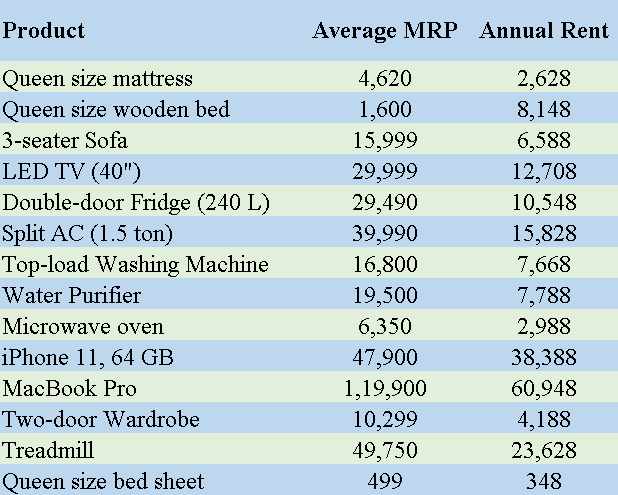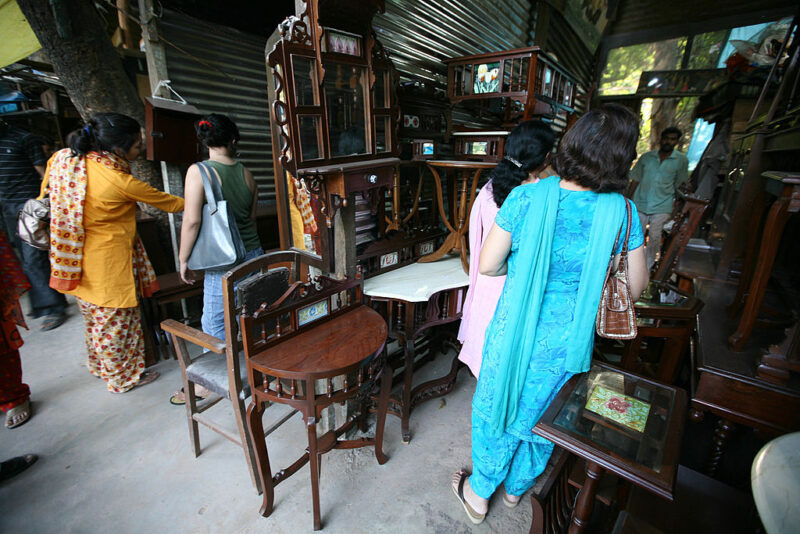Delhi-NCR has the second-highest cost of living for expats, next only to Mumbai, according to the 2021 Mercer data. On average, an individual spends Rs 25,000 a month on primary needs and lifestyle habits. When you add rent to it, the average cost of living can be Rs 40,000 a month.
In such a milieu, buying basic furniture and appliances for your apartment, especially if it is rented, is going to burn a large hole in your pocket. One of India’s leading furniture websites, Pepperfry, sells a single bed for Rs 9,000 and a mattress for Rs 5,000. That’s almost as much as the rent of an unfurnished 1 BHK flat in Lajpat Nagar.
Coming to the rescue of tenants and other savvy residents of the capital are websites that offer furniture for rent. From beds, washing machines and dining tables to mattresses, flowerpots and even iPhones, these websites will rent out almost everything you need for a feasible price. One advantage is that when you relocate, you don’t have to sell these belongings or hire a truck – just surrender all the stuff you rented.
“I would prefer paying Rs 150 a month for a dressing table which also has a long mirror and storage cabinets, than buying one for Rs 2,500. Even if I use it for ten months, I’ll only pay Rs 1,500 in rent”, says Aarti Makwana, a legal associate working in Lajpat Nagar.
How did it start?
Furniture on rent started as a mainstream commercial service with Rentomojo’s launch in 2014. The website was launched by Geetansh Bamania and Ajay Nain – both alumni of IIT-Madras. Bamania worked at Pepperfry and was well-versed in the dynamics of the furniture industry.
He had initially planned to start renting toys because a child usually plays with the toy for two days before getting bored of it and moving on to a newer one. But then, Bamania changed his plan after talking to his brother, who lived in the UK at the time. Bamania’s brother stated that he had leased most of the furniture — as is the norm there.
Thus, Bamania, along with his colleagues, launched Rentomojo in 2014. Others soon followed suit, and furniture for rent became a trend in today’s Indian market landscape. While there are mainstream service providers like Rentickle, Furlenco, City Furnish and Fabrento, there are hundreds of small-scale websites that provide various kinds of furniture for rent. However, currently, they cater to only metropolitan cities like Delhi, Mumbai, Pune, Kolkata, Chennai, Jaipur, Hyderabad, Bangalore, Ahmedabad and Chandigarh.
Wide range of products
Almost everything you can imagine you need in your home is available for rent from these websites. They all have primary categories to segregate their line of products: living room, bedroom, kitchen, storage, appliances, electronics, decor – and the recent addition as a result of the pandemic – work from home (WFH) essentials.
While sofa, bed, fridge, washing machine, microwave oven, water purifier are unquestionably a part of the product range, decor and gadgets have found space on these websites too. Rentickle provides decor items like floor lamps for rent for Rs 79 a month. Rentomojo, on the other hand, rents iPhone for Rs 4,959 a month, a Macbook Pro for Rs 5,079 a month, and an iPad for Rs 4,109 a month.
They also have cheaper options like the OnePlus 6T for Rs 1,779 a month, the Samsung Galaxy J8 for Rs 729 a month, or even the Amazon Fire TV stick for Rs 199 a month. While City Furnish rents bedsheets and pillows for Rs 59 and Rs 29 respectively on a monthly basis, Fabrento goes a step further and rents decor items like ceramic vases for Rs 1,199 a month, and designer easel for Rs 299 a month.
The websites also have secondary products like a bean bag, bamboo chair, portable study/laptop table and various shelves to cater to a larger customer base. Rentomojo and Rentickle rent out fitness essentials and machines like treadmills, cross trainers, exercise bikes and even skipping rope.
Moreover, Rentickle has bikes for rent, but the tenure and pricing are different from the rest of the products. A Pleasure+ two-wheeler bike will cost you Rs 250 a day and Rs 3,500 a month. They also have cars for rent, but only on a daily basis – like mainstream car rental services like Zoomcar, Revv or Rental Cars.

How to get going
Once you select a product, you just need to select the number of months you need this product for, and add the item to your virtual cart. Then, you need to make the payment which comprises monthly rent, a security deposit and applicable tax.
The website will quickly attempt to register you on their database by asking for all or a combination of these documents: ID proof, rent agreement or address proof, and bank statement for the last three to six months.
Some of the websites complete this process online within a few minutes, but others, like Rentickle, will visit the address, if required, to look at hard copies of necessary documents for verification. Upon completing the payment and verification, the product is delivered within a few days and even installed if needed.
“We were looking for a fridge on rent, but didn’t have a rent agreement. Rentickle had a fridge for the cheapest price, but required a rent agreement for verification. So, we skipped it and ordered one from Rentomojo. The fridge – a brand new Samsung refrigerator – was delivered within two days after verification”, says Saurabh Bhatt, a student of Kirorimal College, living in a rented house in GTB Nagar.
Once the tenure or rent period ends, pick-up associates from these services will come to the location, check the state of the product, pack it, and take it away. Explaining the process through her experience, Makwana says, “Most appliances in our previous flat were ordered for a 12-month rent period. But we ended up changing our flat within nine months. So the products we needed were delivered to our new address by the rental service, and those we didn’t need were returned”.
She adds that they were refunded the remaining two months’ rent money and the security deposit at the time of return. This service is common across all the platforms.
Not second hand
Most products delivered to customers are in brand new condition — something that local rental services often fail to provide. “When the delivery of the home gym I ordered arrived, I saw them unboxing the whole thing in front of me. It was a pleasant surprise to me because I thought they would give a used one with a few rusty screws”, says Vartika Agarwal, an Amazon employee and resident of Kailash.
While it’s definitely a welcome service for the customers, one might wonder how the rental services can afford to rent new products to almost every customer.
“The mainstream rental services often tie up with furniture outlets and godowns. Right from procuring items from these suppliers and associating with them for a defined contract period, to delivering quality products to the customers, rental services take care of business at both ends”, says business analyst Satyam Malhotra.
He adds that some rental services procure goods for an annual rent, while others purchase the products at cheaper prices from the suppliers. Some even send the products back to warehouses, after the customer returns them, to get them furnished and polished, and repacked with the brand’s original packaging material, thus letting customers think that a ‘new’ product was delivered.
“The rental services are ready to take the risk of any losses incurred throughout the utilisation period of the product. You have to take that risk in any business. Nothing different here”, he adds.
The rental services provide free servicing and maintenance once the products are delivered to the customer. Repairing the products, replacing defective parts, and cleaning is taken care of by the services, thus ensuring smooth and uninterrupted customer service.
Speaking about her experience, Agarwal further says, “We have been using the washing machine from Rentickle for four months now. A few days ago, we had an issue with the drainage pipe. Apparently, a rat in our building had tried chewing it. There were small holes in the pipe from where water leaked. We contacted Rentickle and they replaced the pipe at no extra cost.”
She also says that when the fridge they had rented from Furlento was damaged, the customer service team had promptly repaired it free of cost; they only had to pay Rs 100 as the mechanic’s visiting charges.
Besides being customer-centric, these rental services are benefitting from the fact that local furniture markets do not sell products – both, new and second hand – at affordable rates. After moving into their rented flat in Kailash, Agarwal and her flatmate searched Delhi’s popular furniture markets like Amar Colony, Munirka market and Banjara market (now demolished) for feasible new or second-hand furniture, but to no avail.
Amar Colony has been the go-to furniture market for Delhi-ites, but the prices are too high now, as compared to the old days. Munirka market sells furniture at cheap rates since the customers are mostly students studying in nearby colleges and Jawaharlal Nehru University (JNU). However, they do not have a wide range of products.

The most popular Banjara Market suffered a hit during the pandemic when it was moved from its original location to Sector 56 in Gurugram. “It’s also so far from central Delhi. Travelling there and coming back with all the furniture we buy was itself expensive”, says Agarwal.
Elaborating on her experience shopping at Amar Colony, Aarti Makwana says, “Even the used furniture was expensive. A chest of three drawers was for Rs 3,200, and it was made of engineered wood. I found a better product on Rentomojo for just Rs 220 per month.”
Locals lose out
While branded rental services have capitalised on the online shopping trend and improvised the ‘furniture-on-rent’ business, it has severely affected local rental services. While Delhi-ites still prefer local shops to rent ACs and coolers during the summers, they mostly do not approach these shops for other furniture products.
Speaking about how he started his rental shop, Rakesh Ghanotri, owner of Hindustan Rentals in Kailash says, “Earlier, we used to give vehicles for rent to the students. Then, we found out that the students who are not from Delhi and are living in rented flats, require all kinds of furniture. We rented some of our furniture from the house, because we were renovating at the time. My son saw a business opportunity there, and that’s how we started with our rental services.”
He adds that in the last few years, their rental service has been approached by not only expats, but locals too. “They find it more cost-effective, and it’s steady money for us too”, he says.
However, with the rise of online marketplaces, sales at Ghanotri’s shop have gone down too. “Since they have a larger reach with a strong marketing and customer service team, people are bound to go to these websites before even thinking of us”, he says.
Ghanotri further says, “A major difference is that we do not provide unconditional servicing. We are small-scale businesses, and tend to charge the customer when it’s their fault the product got damaged. Big companies tend to ignore these faults and incur the loss without having the need to charge the customers.” He cites a limited range of products, and most of the products being available in mint or used condition as other reasons for local rental shops not doing as well as commercial rental services.
“Our customers are mostly the ones we know through our family and friends, and those who approached us because of word of mouth. Beyond that, we don’t have any reach”, he says.
Irrespective of the source of the product, the ‘furniture-on-rent’ business model is most favourable for customers. There is plenty of competition, so customers have several options to compare quality and rates for different products. It acts as a cushion against the high cost of living in most metropolitan cities, simultaneously giving top-notch and hassle-free services.





